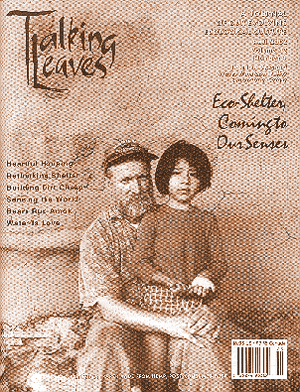

"I want to engage my senses with the natural world, not with artificial constructed environments and advanced technologies. I want the ability to be sheltered from a rainstorm, but I suspect that a small tent would do that for me just as well as a big house. And I want to hear the rain falling--I don't want to be insulated from it in a sterile cubicle. I don't want to trade in the sounds of nature for the hum of a refrigerator or the drone of a housemate's television set. I'd like my shelter to be modest, a barely noticeable part of the landscape--something that allows me to live closer to the world outside, not further away. And, for now, I don't want to be tied indefinitely to one shelter, in one location. I want to be able to move occasionally as I need to; I wouldn't want to stay in one place or one situation just because I 'owned' a shelter there. If I made decisions on that basis, my shelter would own me.
"In my daily life, though, I want to live as wholly as I can in whatever place I inhabit. I don't want to move further from there than I can propel myself under my own body's energy. I don't want to live in 'Anywhere, USA,'--I want to be reminded constantly, through my senses, of the particular place where I am. I want to know that I am alive, in touch with the living world around me. And no matter how much value someone else might place upon a fancy shelter, prestigious social position, or high-paying job, I don't want to be shut up in boxes, either literal or conceptual. My life is worth more to me than money, or than anything money can buy. The land is my temple. These other things don't tempt me, and they don't even appeal to me. I would trade them all for the life I feel called to live."
That was twenty years ago. My friend managed to avoid owning any shelter larger than a tent for nearly two decades, didn't own a computer until about four years ago (when he bought a reconditioned laptop, which runs off of solar power), and first became a "homeowner" of sorts (by buying a yurt and small cabin) just a little over a year ago. He has never structured his life around a car--has rarely needed to commute anywhere (usually working on whatever land he is living on), and when he has commuted, it's been by bicycle, not by car. The used car he has owned for about seven years has never been an essential part of his life, just an occasionally-used convenience, and has actually spent more hours at the mechanic's than being driven.
Over time my friend has found himself drawn into various social networks, activities, work, and cultural enthusiasms that have made his years of living out of a tent seem simple by comparison, and that have involved varying degrees of what might be seen as compromise. He is no longer a strict Luddite, and no longer so fixated on the temple where he is residing that he avoids entering into closer human interactions. In fact, the rural intentional community which he now calls home places a high value on the personal and interpersonal dimensions of being human, and has a social environment more active than any he has experienced before.
But despite these changes, he still spends a large amount of time engaged with the natural world, continuing to work, play, and live outside much of the time, and with only a window or thin yurt-wall separating him from the out-of-doors the rest of the time. Unlike in those early years, however, he has come to peace with being a member of the human species and of human civilization. Either he's matured or he's sold out--maybe both. And, in case you haven't guessed, he's writing this editorial on the aforementioned laptop computer, looking out his window at the garden from which, in a few minutes, he will be harvesting salad greens for a community meal. (His apologies to all who find third-person narratives annoying; at the moment, he's simply tired of writing "I.")
What does this story have to do with the current issue of Talking Leaves? It's to encourage anyone who feels reluctant to become slave to the dominant society's notions of shelter (and who finds the other boxes that fill our conceptual landscapes equally unappealing) to follow your impulses and inner guidance. And it's to reassure those wanting to "come to their senses" in their means of sheltering themselves--or of structuring their lives in general--that many others are following similar paths, and that we can help one another along. "Coming to Our Senses" means trusting what our senses tell us about the world around us and our place in it, and it means choosing or creating structures for ourselves that enhance rather than dull our sensual experience of life's processes. It means allowing our surroundings to nurture rather than thwart our relationships with the rest of the community of earth, water, and sky.
As usual, this issue evolved organically--in fact, the "Senses" theme was not announced, but suggested itself from the material we received. Please help us to allow future issues to evolve organically by contributing your work and by supporting us with your membership. TL is still barely treading water financially (which is why we're printing 32 instead of 40 pages this issue) and may need to undergo further changes next year to return to economic balance. We appreciate your support and readership!
�2002 Talking Leaves
Fall 2002
Volume 12, Number 3
Eco-Shelter, Coming to Our Senses
We welcome your letters!
For a sample copy of the Fall 2002 issue, "Eco-Shelter, Coming to Our Senses," send $6 to
